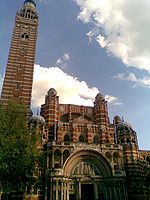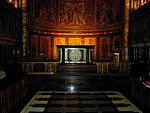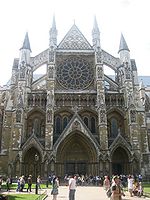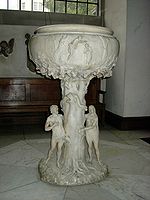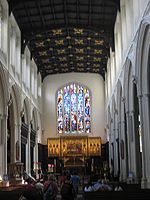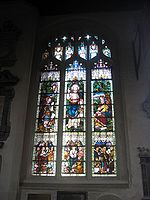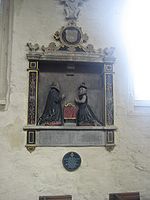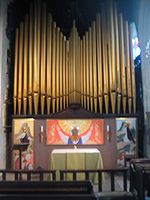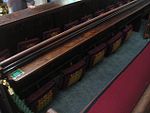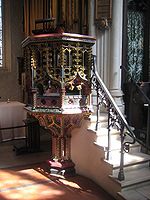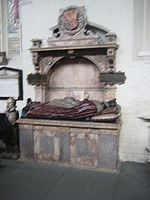Talk:City of London and Middlesex Towns and Villages W
Contents
Wapping
Following war damage, only the tower and part of the outside walls now remain, it has been rebuilt as private dwellings. The churchyard opposite survives as a public open space with some gravestones in situ and others lining the boundary wall.
Westminster
The building in Birdcage Walk was opened in 1963 and replaces that which was destroyed by a V1 flying bomb on Sunday 18th June 1944 during morning service with the loss of 121 civilian and military lives. The chapel is open daily, and the Guards' Museum is opposite.
Westminster Abbey
Westminster, St James
The church is known as St James Piccadilly or St James Westminster and is unlocked during the day. Concerts and recitals take place as well as services. Both the font and altar decoration are by Grinling Gibbons.
A Catholic chapel belonging to the Portuguese embassy existed here in the early 18th century until the Bavarian Embassy took over the premises in 1747. The chapel was seriously damaged by fire in the Gordon Riots of 1780, the present chapel opening in 1790. It became the parish church in 1854 with the title "Church of the Assumption" but continued to be known as the Bavarian Chapel until the early 20th century.
Westminster, St John
St John, in Smith Square is now used as a venue for concerts and recitals.
Westminster, St Margaret
St Margaret's is open daily. The present building, consecrated in 1523, is the third on this site. Since 1614 St Margaret's has been the church of the House of Commons. Windows commemorate Caxton and Milton, who worshipped here, and Raleigh, who is buried in front of the altar, under the glorious window made for King Henry VIII and Catherine of Aragon in c1520. After about nine hundred years of service as a parish church for the people of Westminster, St Margaret's was placed under the care of the Dean and Chapter of Westminster by Parliament in 1973. It is still in regular use for worship and for recitals of music. (Information from church noticeboard)
Situated opposite Westminster Abbey, Central Hall was built in 1912 to commemorate the 100th anniversary of the death of John Wesley, founder of Methodism. Its design was chosen by competition the brief for which was that it was not to resemble a church. As well as being a place of worship the building is used as a conference venue. Guided tours are available daily without booking (unless it is for a large party) on request at Visitor Services in the reception area although the Great Hall may be omitted should a conference be in progress. The cafe in the basement is open to the public.
- Christ Church, Broadway, Westminster – bombed 1941, later demolished.
